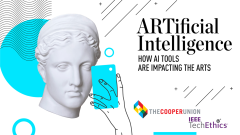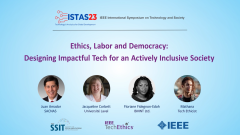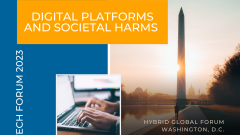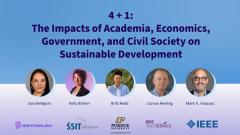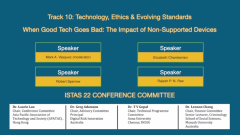Health & Human Well-Being | Session 3: Engagement Opportunities & Policy Debate Roundtable | IEEE TechEthics & UN-DESA
About the Video: This roundtable session provides information on how to get engaged in the UN and its policy debates on technologies for health and human well-being, as well as similar engagement opportunities across various parts of IEEE.
About the Event: "New Technologies, Ethics and Policy Engagement for Sustainable Development" is a new series of online events conceived by IEEE TechEthics and the UN Department of Economic & Social Affairs (UN-DESA) as a way to facilitate and share technology solutions and promote substantive discussions among policymakers, engineers, legal experts, ethicists, social scientists, and others on a variety of topics related to the Sustainable Development Goals. This event in the series focused on Health & Human Well-Being.
View/download session 3 handouts (PDF)
About the Speakers:
- Spring Gombe is an advocate for access to knowledge, with a focus on health. Her professional focus is on access to health for neglected and vulnerable people. She participates in global efforts for public return on public investment in biomedical R&D. She currently manages the joint UN Tech Bank/WHO/UNDP/UNCTAD Tech Access Partnership to afford developing countries equitable access to COVID-19 relevant health technologies. She was previously Policy Advocacy Manager with the Drugs for Neglected Diseases Initiative. She has worked with the leading civil society health policy and technology advocacy groups, including Knowledge Ecology International, where she co-ordinated the global NGO i+a (innovation+access) platform at the World Health Organisation Intergovernmental Working Group on Public Health, Innovation, and Intellectual Property. She is a member of the board of The Commons Network and a past member of the Drugs for Neglected Diseases Initiatives Scientific Advisory Committee for AS/AQ. She completed postgraduate studies in public policy at New York University, and her undergraduate degree in Biological Sciences at Cornell University.
- Shantanu Mukherjee is a micro-economist interested in poverty, inequality, health and sustainability. Apart from cross-cutting SDG analysis, his current work focuses on strengthening the science-policy interface and enhancing the impact of science, technology and innovation on the SDGs. His team leads the UN support for the Global Sustainable Development Report (GSDR) and the Technology Facilitation Mechanism (TFM). Before this, he led the research and writing unit of the United Nations’ Development Programme’s (UNDP) flagship Human Development Report, focusing especially on the analysis of jobs and livelihoods in the context of the sustainability transition and rapid technological change. Prior to that he was head of UNDP’s MDG (Millennium Development Goals) policy work, working directly with many developing countries. Some of his most interesting assignments during this period were with Bangladesh, Colombia, Indonesia, Jordan, Liberia, Myanmar, Pakistan, Togo and Yemen. Shantanu began his career with the Indian Government in different areas of finance as well as development policy planning and implementation. He earned a Ph.D. in Economics from Princeton University and also holds advanced degrees in Public Policy and Physics.
- As the Healthcare Life Sciences (HLS) Practice Lead for the IEEE Standards Association (SA), Maria Palombini is focused on recruiting a global community of multi-disciplinary stakeholders to openly collaborate and develop solutions to enable trust in and validation of breakthrough technologies/applications that will provide universal and sustainable access to quality of care, privacy and protection for all individuals. The IEEE SA HLS Practice enables an open and collaborative platform to build consensus and develop solutions to enable trust in new technology/applications in the agriculture, environmental, pharma/biotech, healthcare, and global wellness domains. Before joining the IEEE SA, Maria founded DisruptiveRx™ Media, the first information company to introduce blockchain/DLTs as a viable option to addressing the many data integrity and security challenges within the pharmaceutical value chain. Maria’s professional highlights include growing an African-based largest mining investment platform into a multi-national brand while bringing innovative communication and information programs to global markets and various industries including financial, pharma/life sciences, natural resources, and telecommunications. Maria currently holds an MBA from the Rutgers Graduate School of Business and a BA and BS from Rutgers College at Rutgers University, the State University of New Jersey.
- Laura Specker Sullivan, Ph.D., is a specialist in interdisciplinary and cross-cultural ethics in technology and medicine. She is an Assistant Professor of Philosophy at Fordham University. She has held fellowships at the Center for Bioethics at Harvard Medical School, the Center for Sensorimotor Neural Engineering at the University of Washington, Neuroethics Canada at the University of British Columbia, and the Kokoro Research Center at Kyoto University. She is a member of the program and nominating committees for the International Neuroethics Society, a member of the IEEE Brain Initiative Neuroethics team, and a member of the Philosophy and Medicine committee of the American Philosophical Association. Her work has appeared in Philosophy and Technology, Science and Engineering Ethics, Brain-Computer Interfaces, the Journal of Neural Engineering, the American Journal of Bioethics – Neuroscience, and Physical Medicine and Rehabilitation.
- Mark A. Vasquez (moderator) is a Certified Association Executive (CAE) with over 25 years of experience in association management at IEEE. He currently serves as the program manager for IEEE TechEthics, a program that drives conversations about the ethical and societal impacts of technology. In this capacity, he works to develop relationships with others in the technology ethics community, produces events, convenes thought leaders, and more. Mark is an engineering graduate of The Cooper Union. - Sampathkumar Veeraraghavan is a globally renowned technologist best known for his technological innovations in addressing global humanitarian and sustainable development challenges. Currently, he serves as the global chairman of the IEEE Special Interest Group on Humanitarian Technology (SIGHT) managing the portfolio of sustainable development programs globally. He is also the incoming global chair for the 2021 IEEE Humanitarian Activities Committee (HAC). He serves as an expert in the Broadband commission working group on school connectivity that is co-chaired by UNESCO, UNICEF and ITU to drive “GIGA’, a Global School Connectivity Initiative. He is the founder and president of the technology-based humanitarian program, “The Brahmam," which aims to deliver next-generation social innovations to achieve sustainable development goals and benefit marginalized communities globally. He received his B.E. degree in Computer Science and Engineering (2005) from Anna University, India, and M.S. degree in Electrical Engineering from Tufts University, USA (2010). Throughout his career, he spearheaded cutting-edge technology development programs in the areas of Artificial Intelligence, computer vision, spoken language technology, cloud computing, information systems, assistive technologies and sustainable technologies. For over a decade, he delivered technology-driven sustainable development programs that brought together the engineering communities, non-profit organizations, governmental agencies and disability advocacy groups to improve the living conditions of children with disabilities and impoverished women and students in developing nations. He is accredited with numerous global awards for his leadership contributions and innovations in leading technology-based humanitarian programs. Most recently, IEEE honored him with the 2020 IEEE Theodore W.Hissey Outstanding Young Professional Award “for inspiring leadership, exemplary innovations, and pioneering contributions to addressing global challenges through technology-driven IEEE humanitarian programs."
Recorded on 17 December 2020.
About the Video: This roundtable session provides information on how to get engaged in the UN and its policy debates on technologies for health and human well-being, as well as similar engagement opportunities across various parts of IEEE.
 Cart
Cart Create Account
Create Account Sign In
Sign In

